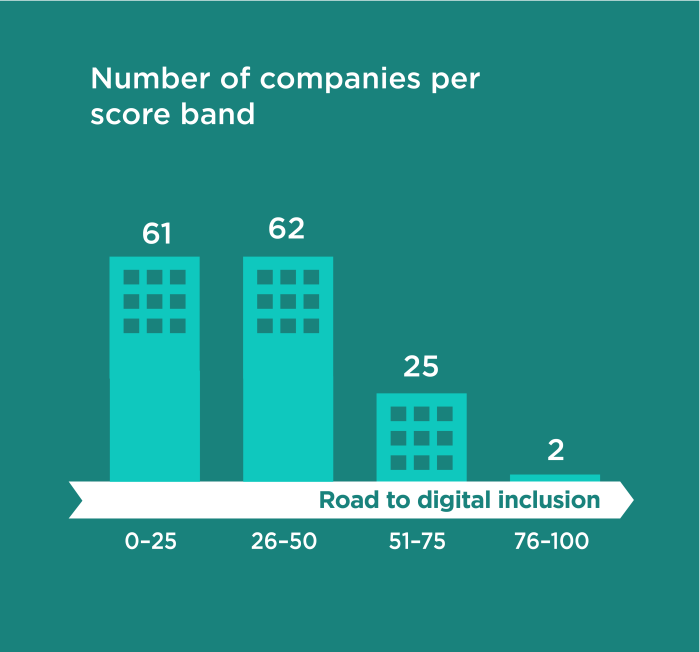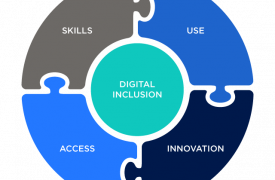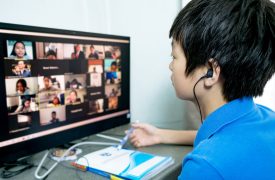50 new digital technology companies to be ranked in Digital Inclusion Benchmark
The Digital Inclusion Benchmark assesses company performance towards a more inclusive digital economy and society. These leading digital companies, from Acer to ZTE are based across the world from Argentina to Turkey, and form part of the SDG2000, the World Benchmarking Alliance’s (WBA) list of the world’s most influential companies. All of these companies have a vital role to play in advancing digital inclusion and achieving the sustainable development goals meaning their actions are essential in shaping wider systemic transformation. These companies have the capacity to make real change in driving a sustainable future.
Who are the 50 new companies?
In 2022, 50 additional keystone digital technology companies will be assessed, bringing the total number of companies assessed to 200. The 50 new additions are companies with global reach, such as Panasonic and Hewlett Packard Enterprise alongside popular ride hailing companies such as Lyft and DiDi. In line with the WBA’s focus on impact in developing countries, several keystone companies headquartered in developing countries are included in list, including recently privatized Ethio Telecom, one of the largest telecommunications operators in Africa.
The new 50 companies are listed below:
What is the Digital Inclusion Benchmark?
The COVID-19 pandemic highlighted the importance of digital inclusion globally as connectivity became pivotal to education, work opportunities, and even health and wellbeing. Throughout the pandemic, the development and use of digital technologies was accelerated, and these changes are likely to stay, raising the importance of pressing issues such as access to digital technologies, comprehensive digital skills training, user safety and inclusive innovation. To this end, the benchmark looks at company efforts across four areas: For more information about our approach, please consult the methodology.
- Enhancing universal access to digital technologies.
- Improving all levels of digital skills.
- Fostering trustworthy use by mitigating risks and harms.
- Ensuring open, inclusive, and ethical innovation.
Digital companies must leave no one behind
Progress in advancing a more inclusive digital society must take a holistic approach to ensure basic social principles are also being met. Accordingly, this year all 200 benchmarked digital companies will also be assessed against core social indicators that outline the fundamentals that all companies should be meeting to ensure no one is being left behind in the transition to a more sustainable future.
Based on three categories (human rights, decent work and ethical conduct), companies are assessed on their work to further a more holistic sustainable future, including their commitments to human rights alongside their commitments to pay living wages and fair taxes. The core social indicators are detailed in the social transformation framework.
What progress do we see? Who are the leading companies?
In 2021, the second iteration of the Digital Inclusion Benchmark assessed the world’s 150 most influential technology companies to rank how their work contributes towards bridging the global digital divide. The 2021 assessment results show that the majority of the 150 most influential tech companies have not yet embraced their responsibility towards digital inclusion with an average performance of just 33%. Telefónica, Telstra, and Orange are once again leading the packing as the top three companies championing digital inclusion in the benchmark. These companies demonstrated a holistic approach and comprehensive adherence to best practices across the four measurement areas.

It was also found, that while companies have been enthusiastic about the benefits of AI, overall, the industry is failing to consider the risks with only 20 companies having an ethical AI framework. These companies are failing to innovate in an inclusive and ethical manner. This failing is highlighted by the lack of representation within digital companies, with women on average making up only 23% of the technical workforce. Inclusive workforces draw from the experience of their diversity allowing innovation to happen in an open, inclusive and ethical way. A closer look at last year’s results including rankings and scorecards can be found on the results portal. A deep dive into the benchmark, the key findings, the results and trends are outlined in the insights report.
For any questions, please contact info.digital@worldbenchmarkingalliance.org or consult the FAQ.


